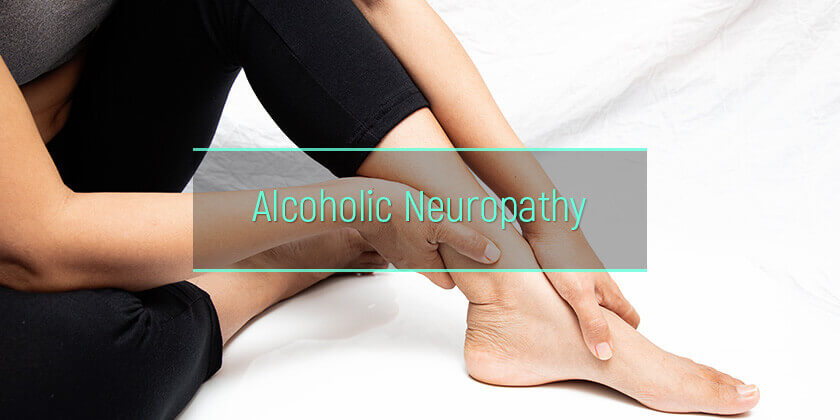
Alcohol has a toxic effect on the nerve tissue, and excessive alcohol use can lead to a condition called alcoholic neuropathy. The disease manifests itself through a tingling sensation in the limbs, caused by nerve and brain damage from alcohol consumption.
- What is alcoholic neuropathy?
- How does alcohol cause neuropathy?
- How much alcohol causes neuropathy?
- What are the risk factors for alcohol polyneuropathy?
- What are the signs and symptoms of alcoholic neuropathy?
- What are the dangers and effects of alcoholic polyneuropathy?
- How is alcohol neuropathy diagnosed?
- Can alcoholic neuropathy be reversed?
- How is alcoholic neuropathy treated?
What Is Alcoholic Neuropathy?
In alcohol neuropathy, the nerves that send information between the brain and the body’s extremities become damaged due to excessive alcohol use.
Alcohol consumed in excess for a long time can lead to nerve damage and malnutrition, both important contributors to this condition. Ethanol impedes the transportation, processing, and absorption of essential nutrients, resulting in a deficiency which can harm health and preventing nerves from functioning correctly.
Some researches show that almost 65 percent of people in the US, who suffer from alcohol use disorder, have also been diagnosed with alcoholic neuropathy.
Alcohol-Induced Causes Of Neuropathy
Thiamine deficiency
Thiamine, the antineuritic factor or the antiberiberi factor is an essential vitamin in the pyruvate metabolism and has a critical role for the health and proper functioning of the peripheral nervous system. A deficiency in thiamine is closely linked to chronic alcoholism and alcoholic neuropathy.
Neurotoxic effects of ethanol
Besides thiamine deficiency, other studies showed a direct neurotoxic effect caused by alcohol and its metabolites. Lettsom was the first one to link the neurotoxic influence of alcohol to alcohol-related peripheral neuropathy. For more than 100 years alcohol was considered a neurotoxin which called a disease called ‘arthrodynia a potu.’
The disease was observed to start in the lower limbs and extend upward affecting the hands and arms. The main symptom was a pain, which was excruciating at times, but which could wax and wane. Other noted signs of the neurotoxic effect were disturbances to the cardiovascular system and the gastrointestinal tract.
Alcohol depletes the pool of liver proteins
Chronic alcohol abuse can exhaust the pool of liver proteins, which are crucial in energy production. Once alcohol enters the organism, it is degraded by ethanol dehydrogenase into acetaldehyde and then into acetate which is metabolized. But there is always some amount of acetaldehyde that will not get metabolized and which will bound to proteins.
These abnormal proteins deteriorate the hepatic mitochondria leading to hepatic cirrhosis and also affect the nervous system, which does not have any protective barrier, leading to neuropathy.
How Much Alcohol Causes Neuropathy?
The two main factors associated with alcoholic neuropathy’s development are the duration and amount of alcohol consumption. The condition is more prevalent in heavy, frequent, continuous drinkers compared to episodic drinkers.
Alcoholic neuropathy does not display the same symptoms in all individuals. Some can abuse alcohol their entire lives and still do not develop the disorder, while others can see the signs after a few years of heavy drinking.
It is good to know that the consensus of one alcoholic drink per day for women and two for men does not imply any risk of being affected by the disease.Alcoholic neuropathy develops in almost half of the long-term heavy drinkers. This means that if a person has been drinking heavily over the past ten years, there is a significant risk of developing this condition.
Risk Factors For Alcohol Polyneuropathy
Genetics
Once alcohol enters the bloodstream is starts to be degraded by alcohol dehydrogenase (ADH) and aldehyde dehydrogenase (ALDH) into acetate to be further metabolized. Both ADH and ALDH occur in several forms being encoded by different genes and with different ethnic distributions.
For example, the ADH1B*2 allele is responsible for the rapid ethanol oxidation and protects against alcohol dependence in some populations. This means that East Asians and people of Jewish descent, who have the ADH1B*2 allele at high frequency, will be more protected against alcoholism, and therefore alcoholic neuropathy, than Europeans.
High total lifetime alcohol consumption
The quantity and period of alcohol intake are strongly connected to the prevalence of neuropathy. Alcohol-induced neuropathy is more common in continuous and frequent heavy drinkers with 29.6% and 29.9% compared to episodic drinkers with 11.3% of those who took part in the study.
Symptoms of the disease can appear in the first 1–5 years of alcohol abuse and severe alcoholic polyneuropathy after ten years.
Family history
The family history of alcoholism was also found as a high-risk factor of the disease. The study showed an incidence four times higher in the number of patients with alcohol-related neuropathy that also had a parental history of alcoholism, compared to the ones without. The authors believe that there might be an inherited genetic risk of developing this disease.
Signs And Symptoms Of Alcoholic Neuropathy
The symptoms of alcohol neuropathy vary from person to person. Some might experience only one symptom, while others might be affected by several. Some of them are similar to the side effects of drinking alcohol every day.
Some of the most common alcoholic neuropathy symptoms, depending on the affected body parts are:
Limbs
- Loss of sensation
- Cramps
- Tingling sensation
- Loss of sensation
- Muscle spasms or weakness
- Muscle atrophy
- Numbness
- Shakes from alcohol
Bowel and urinary system
- Urinary retention
- Incontinence
- Constipation
- Diarrhea
- Nausea or vomiting
- Abdominal bloating
Other areas of the body
- Sexual dysfunction
- Infertility in men
- Fainting or dizziness
- Difficulty swallowing
- Impaired speech
- Temperature sensitivity
Alcohol neuropathy symptoms can also be mistaken for signs of delirium tremens; that is why only a trained physician can put the correct diagnosis.
Dangers And Effects Of Alcoholic Polyneuropathy
Decreased Sensation
Because the disease affects sensory nerves, it leads to a decrease in sensation of the feet and hands, with serious consequences such as:
- Frequent scrapes, bumps, and wounds due to reduced ability to feel pain.
- Bleeding and infections due to the inability to feel and protect wounds and tender sores causing further injury and infection.
- Inability to properly coordinate and balance fine motor skills, such as finger movements and walking.
Pain and Hypersensitivity
Another effect of this disease is uncomfortable and painful sensations such as hypersensitivity or pain to touch. Some people might feel constant pain in the feet or hands which feels like throbbing, burning or sharp needles and pins.
Muscle Weakness
Nerve damage can lead to motor weakness. Muscles need messages for nearby nerves to function correctly. When these messages are interrupted, the muscles do not work properly, and this usually translates in the weakness of the feet and hands.
Autonomic Neuropathy
The intestines, stomach and the bladder are controlled by autonomic nerves. When these nerves are weakened, the results are sexual dysfunction and impaired bowel and bladder function.
Diagnosing Alcoholic Polyneuropathy
There are several tests that can be done to diagnose alcohol neuropathy and usually, more than one is necessary.
- Complete blood count to see how well the immune system is working
- Esophagogastroduodenoscopy to check the causes for vomiting and nausea
- Neurological examination to test the muscle strength, reflexes, sensory function and coordination
- Blood chemistry test to check the overall health, liver and kidney function and blood sugar levels
- Electromyography to analyze electrical activity in the muscles
- Nerve conduction test to check the strength and speed of the nerve signals
- Nerve biopsy to test nerve tissue for damage
- X-rays for the upper gastrointestinal and small bowel to see how well the digestive tract functions
Is Alcoholic Neuropathy Reversible?
People diagnosed with alcohol neuropathy can alleviate the current symptoms and also prevent future nerve deterioration by stopping drinking.
By reducing or eliminating alcohol consumption and with the right treatment plan, reversing alcoholic neuropathy can be partial or complete, depending on how advanced the disease is and how much nerve damage has been caused.
Alcoholic Neuropathy Treatment
There is no alcoholic neuropathy cure, but the first step to do is to stop drinking. The doctor might also suggest an inpatient detox or outpatient rehab in an alcohol treatment center if the patient’s alcohol disorder is severe. Sometimes treatment for alcohol poisoning might be needed.
Other options include community-based support offered by various organizations such as Self-Management and Recovery Training or Alcoholics Anonymous.
Another critical step in the treatment of this condition is to manage symptoms with ongoing support, depending on the patient’s needs:
- Vitamin supplements
- Prescription or over-the-counter pain medication
- Physical therapy to help with balance and muscles problems
- Medication for urinary problems
- Orthopedic appliances to help with mobility (orthidic devices, stair lifts, pull bars in the bathroom)
The alcoholic neuropathy recovery time varies, depending on the person’s willingness to eliminate alcohol intake and accept a personalized treatment plan.
Preventing Alcoholic Neuropathy
Alcohol neuropathy can cause permanent brain damage, as well as motor impediments. The best way to avoid these effects is to prevent the disease by avoiding excessive alcohol intake and stopping drinking at the first symptoms of the condition.
Seeking immediate help, eating a healthy diet, taking vitamin supplements and not being afraid to ask for specialized help can help the person return to normal life and deal with dry drunk traits before permanent nerve damage incurs.



